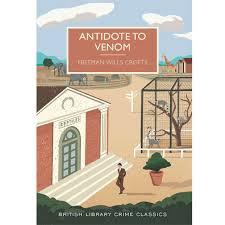
I was just telling you about Capital Crimes, which I'm going to be reviewing in Shiny 5. Here's another of the wonderful British Library Crime Classics. Freeman Wills Crofts was a celebrated and extremely prolific Golden Age writer, producing 33 full-length novels and countless short stories between 1920 and 1957. This one falls somewhere in the middle, having been published in 1938. He's probably best known for his Inspector French series, and this turns out to be one of them -- sort of. I say that because it really is a novel in two halves. In Martin Edwards' introduction, he calls this an ingenious story structure, but to be honest I wasn't very taken with it.
Let me explain. The first half of the novel centres on George Surridge. He is a respectable middle-aged man, the director of Birmingham Zoo. He's married to Clarissa, but the marriage has gone sour. She wants a better lifestyle, but he can't afford it, and on top of that, he has gambling debts. Then he meets Nancy, an attractive widow, falls head over heels, and starts spending money he doesn't have on rented cars and posh takeaway teas. Things are getting increasingly desperate, but he's buoyed up by the knowledge that his ancient aunt can't live much longer, and when she dies. he'll inherit a fair amount. At this point you probably think he's going to murder her, but he doesn't (sorry, a bit of a spoiler), and is delighted, when she dies a natural death, to discover that his inheritance is substantially larger then he was expecting. But there's a problem -- Capper, the solicitor who is handling the estate, has embezzled the money. However, being an ingenious sort of man and expecting a large inheritance himself, he puts a plan to George which looks absolutely infallible. And so the two of them work together, and everything looks as if it will succeed. But....
At this point, about three quarters into the novel, we are suddenly introduced to Chief Inspector Joseph French of Scotland Yard. French hears about the case, which has been dismissed as insoluble, and decides to have a go. It's been a fiendishly clever murder (even George doesn't know how it was actually done) but French is a brilliant detective and manages to work out the motive, means and method, and finally manages to pin it on Capper, the main suspect. But he knows that Capper could not have acted alone, and the net closes slowly on George himself.
I was loving this novel all the way through the section that dealt with George. Although Wills Crofts tells the story in the third person, it's all from George's point of view, and we see clearly how his brain becomes increasingly anxious, besotted, muddled and confused. Everything gets worse once he learns of Capper's plan. Certainly it offers a perfect solution to all his problems, but George is not a fundamentally bad man, and agonises through many sleepless nights on the rights and wrongs of it all:
what...if it meant George's own escape from ruin? What if it meant Nancy? If it meant, if fact, everything that made life worth living?
The sweat formed on George's forehead as he considered these alternatives. It was not, he told himself, a question of doing right or wrong: whatever he did would be wrong. It was a choice of two evils. Which was the lesser? Which -- was -- the -- lesser?
If only we could have stayed with George all the way through, I'd be giving this novel very high marks indeed. Unfortunately, notwithstanding French's extraordinary skill in solving this apparently impossible crime (it involves a home-made apparatus so complicated that there's an explanatory diagram in the text), it just lost me at this point. I found French and his cronies very boring and flat after the excitement and authenticity of George's mental gymnastics, and couldn't wait to get back to see what he was actually up to. When we do finally find out, right at the end, there's another slightly bizarre twist in which religious faith suddenly pops up as the 'antidote' to sin. Wills Croft was an evangelical Christian, so this ending was entirely in keeping with his own belief system, but modern readers of different persuasions may find it a little jarring.
In the end, then, taking the novel as a whole, it didn't entirely work for me. But don't let that put you off. Wills Crofts at his best was clearly a remarkable and innovative writer, and I'm looking forward to reading more of his work. And watch out for Simon's review of another of his reprinted novels, The Hogs Back Mystery, in Shiny 5, coming out in early April.
